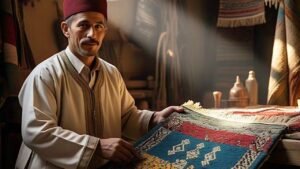
In the labyrinthine alleys of Fez, the soul of Morocco’s spiritual capital beats with the sound of hammer on metal. In the heart of this ancient city, at the historic Place Seffarine, artisans like Mohamed Kobbi breathe life into copper, transforming it into exquisite copper cookware that echoes centuries of tradition.
At the age of fifty, Mohamed is more than just a coppersmith; he is a guardian of heritage. His hands, hardened by years of toil, skillfully shape copper into cookware that is both functional and beautiful. In his small workshop, where tradition meets modernity, Mohamed’s craft exemplifies the enduring legacy of Moroccan craftsmanship.
Copper Pounding: A Legacy of Moroccan Jews

As we observed Mohamed at work, the rhythmic pounding of metal transported us back in time. We were compelled to learn more about this craft that has withstood the test of time. “We are coppersmiths,” Mohamed began, his voice tinged with pride. “In Arabic, we are known as ‘Seffarine,’ a name derived from the yellow color of brass (‘Sfar’ in Moroccan Arabic).”
Historically, the artisans of Place Seffarine worked with brass, a material more readily available in the past. However, as brass became scarcer, copper took its place as the metal of choice. Today, the vibrant displays of copper cookware in the square are a testament to this shift.
Mohamed passionately recounts the origins of this ancient craft, crediting Moroccan Jews for introducing copper pounding to Fez. “They were the first to practice this craft here, in this very square,” he explains. “Thanks to them, this art has been passed down through generations, preserving our heritage.”
Crafting Copper Cookware: A Tradition of Excellence

In the bustling square of Seffarine, artisans like Mohamed Kobbi continue to create a dazzling array of copper cookware. From fryers and pots to the large “Tanjir,” used for cooking Khlea, a traditional Moroccan preserved meat, the variety is as diverse as it is impressive.
“We craft copper pots in all sizes, often customized to meet the needs of our clients,” Mohamed shares, his hands never pausing in their work. “If it weren’t for this demand, our craft might have been replaced by machines long ago.”
The diversity in the sizes and shapes of copper cookware not only sustains the craft but also helps it resist the encroachment of modern manufacturing techniques. “Every piece we make is a testament to the enduring power of handmade artistry,” Mohamed adds, with a hint of defiance.
Copper Cookware: A Tourist’s Treasure
As we continue our conversation, Mohamed reveals a lesser-known aspect of his trade—the source of his raw materials. “We import copper from outside Morocco,” he explains. “We purchase it on credit, and due to our limited resources, we store only what we can afford in our small workshops.”
The handcrafted nature of copper cookware means that each piece is unique, often sold as soon as it is made, with little need for long-term storage. However, despite the artistry involved, the craft’s commercial success hinges largely on foreign tourists. “Most Moroccans find copper cookware too expensive,” Mohamed admits, “It’s often beyond their means.”
Copper Cookware: Health Benefits and Uncertain Future

Beyond its aesthetic appeal, copper cookware is valued for its health benefits. “Copper is one of the healthiest metals to cook with,” Mohamed explains, his eyes lighting up with enthusiasm. “It kills germs, microbes, and bacteria when heated—something that can’t be said for aluminum or other materials.”
Moreover, copper is essential for the human body, aiding in the formation of red blood cells and supporting healthy bones, blood vessels, and the immune system. Yet, despite these advantages, Mohamed laments that many people remain unaware. “It’s all available online, but few take the time to learn.”
As our time with Mohamed draws to a close, he shares his concerns for the future of his craft. “This ancient art is fading,” he says, his voice tinged with sadness. “Young artisans are looking elsewhere, to trades that are easier on their hands and appearance.”
But even in the face of uncertainty, Mohamed remains hopeful. “I dream that all Moroccan crafts will be encouraged, preserved, and celebrated, more than ever before.”





How can we contact Mohamed and other saffarine?
Very nice article ! It lets me feel like I’m there at Seffarine place. Thank you